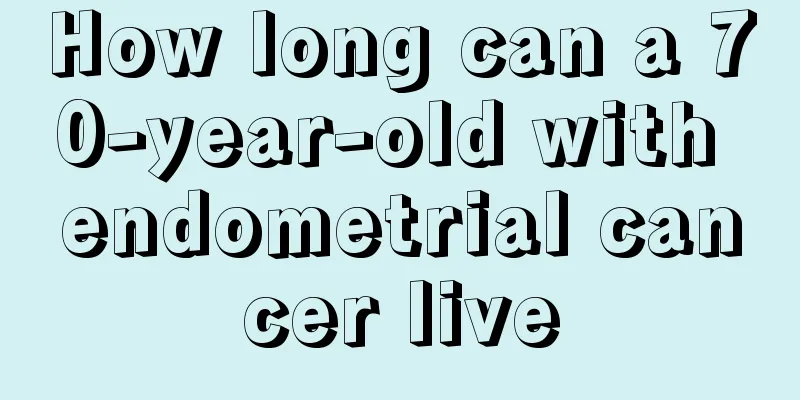How long can a 70-year-old with endometrial cancer live

|
The survival of a 70-year-old endometrial cancer patient depends on the cancer stage, treatment method and physical condition. Early detection and active treatment can significantly prolong the survival period. Treatment options include surgery, radiotherapy, chemotherapy and targeted therapy. The 5-year survival rate of early-stage patients can reach more than 90%. 1. Surgical treatment: Surgery is the main treatment for endometrial cancer. Patients in the early stage usually undergo a total hysterectomy, including the removal of the uterus, fallopian tubes, and ovaries. For patients in the advanced stage, lymph node dissection may be required to completely remove cancer cells. The postoperative recovery period is about 4-6 weeks, and care should be taken to avoid strenuous exercise and infection. 2. Radiotherapy: Radiotherapy is often used as an adjuvant therapy after surgery to reduce the risk of recurrence. External radiation therapy kills cancer cells through high-energy rays, while internal radiation therapy places the radiation source directly into the uterine cavity. Side effects such as fatigue and skin reactions may occur during radiotherapy, and regular review and adjustment of the treatment plan are required. 3. Chemotherapy: Chemotherapy is suitable for advanced or recurrent endometrial cancer. Commonly used drugs include paclitaxel, carboplatin and doxorubicin. The chemotherapy cycle is usually 3-6 courses, with an interval of 3-4 weeks between each course. During chemotherapy, blood routine and liver and kidney function should be closely monitored to prevent infection and bleeding. 4. Targeted therapy: Targeted drugs such as bevacizumab and pembrolizumab inhibit tumor growth by specifically acting on molecular targets on cancer cells. Targeted therapy has relatively few side effects, but the cost is high, and it needs to be selected according to the patient's financial situation and condition. 5. Nutritional support: Patients need to maintain a balanced diet, increase protein and vitamin intake, and enhance immunity. Recommended foods include lean meat, fish, soy products, fresh vegetables and fruits. Avoid high-fat, high-sugar and irritating foods to reduce gastrointestinal burden. 6. Psychological counseling: Cancer patients are often accompanied by anxiety and depression. Psychological counseling can help improve the quality of life. Family members should give patients full care and support, encourage them to participate in social activities, and maintain a positive attitude. If necessary, they can seek professional psychological counseling. 70-year-old endometrial cancer patients can still expect to have a longer survival and good quality of life through standardized treatment and comprehensive management. Early diagnosis and individualized treatment are key. Patients should actively cooperate with regular review, adjust treatment plans in a timely manner, and pay attention to nutrition and psychological support to comprehensively improve prognosis. |
<<: What are the dietary factors that lead to gastric cancer
>>: How to treat cervical cancer hypertrophy
Recommend
Can baking soda cure stomach problems?
It is said among the people that if you feel stom...
I feel flustered and my hands are shaking after drinking coffee
Nowadays, coffee is a drink that is loved by many...
How harmful is hamartoma
Health preservation requires following the laws o...
What should I do if my face is allergic to mango?
Some people experience itching and redness on the...
The battle between the red-faced and white-faced people at the wine table
In our impression, men with red faces are mostly ...
What is the order of using lard ointment
Lard ointment is a particularly moisturizing skin...
Which flowers are the best at absorbing formaldehyde
Formaldehyde is a toxic substance that can be fou...
Is acupuncture effective for rhinitis
In fact, rhinitis is very difficult and complicat...
What are the examination methods for small cell lung cancer
What are the examination methods for small cell l...
I fell down and felt dizzy, nauseous and wanted to vomit
If you feel dizzy, nauseous and want to vomit aft...
Systemic symptoms of patients with lymphoma
The clinical manifestations of lymphoma mainly in...
How many times do you brush your teeth every day?
Most people know that they need to brush their te...
What are the dietary methods for nourishing the kidney and strengthening the spleen?
To nourish the kidney and strengthen the spleen, ...
What to do if the milk in the breast is weaning
Many women choose to breastfeed their babies beca...
What plants are there in summer
There are many plants in summer and their growing...









